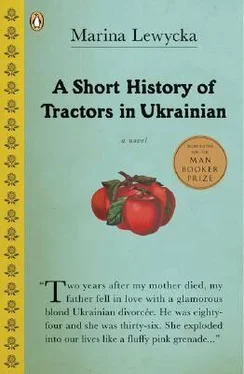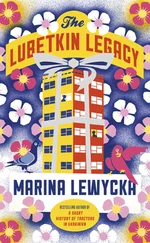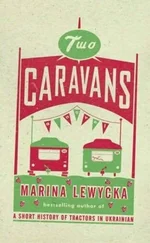One day, the winds of war blew War Baby’s mother back to the village: sheome back and she didn’t leave. At night, War Baby and her mother snuggled up in bed together and her mother told her stories about Great-Grandpa Ocheretko and his amazing black horse called Thunder, about Baba Sonia’s wedding in the Cathedral of the Golden Domes, and about brave children who slew witches and demons.
Mother and Baba Nadia still argued, but they didn’t argue as much as before, for Mother went out to work every day in the local kolkhoz , where her veterinary skills were very much in demand, even though she had only completed three years of training. Sometimes she was given money, but more often the farnvmanager paid her in eggs, wheat, or vegetables. Once she stitched up the belly of a pig that had been gored by a cow, using black button thread, for surgical suture was nowhere to be found. The sow lived, and when it produced eleven piglets, Mother was given one to bring home.
Then soldiers came to the village-German soldiers, then Russian soldiers, then German soldiers again. The village watch-mender and his family were taken away one afternoon in a tall windowless van, and were never seen again. Their oldest daughter, a pretty quiet girl aged fourteen or so, had managed to run away when the soldiers came, and Baba Nadia took her in and hid her in the hen-house (the fearsome cockerel had long since been stewed and his spurred feet turned into the most delicious chicken soup). For although Baba Nadia was a strict woman, she knew what was right and what was wrong, and taking people away in the tall windowless van was wrong. Then one night, someone set fire to the hen-house. No one knows who it was. The watch-mender’s daughter and the two remaining chickens perished in the blaze.
Eventually, the winds of war blew War Baby’s father home, too. Very early one morning, while it was still dark, an emaciated man with a terrible suppurating wound on his throat arrived at the door. Baba Nadia let out a scream, and prayed for mercy. Grandfather Mayevskyj went into the village and bribed someone to let him have some medicines that were supposed to be for the soldiers. Mother boiled rags and cleaned the wound. She stayed at his bedside day and night, and sent War Baby out to play with cousin Nadia. From time to time, War Baby crept into his room and was allowed to sit on the bed. He squeezed her hand, but he didn’t say anything. After a few weeks, he was well enough to get up and wander about the house. Then just as mysteriously as he had arrived, he disappeared.
Soon after, it was time for War Baby and her mother to leave too. German soldiers came into the village and took all the healthy people of working age, and put them on a train. They took War Baby’s mother. They would have left War Baby behind, but Mother screamed so much, they let her come too. It was a goods wagon with no seats: everyone sat crammed together on bales of straw, or on the floor. The train journey lasted for nine days, with only sour bread to eat, and very little water, and just a bucket in the corner of the wagon for the toilet. But there was an air of excitement.
“We are going to a camp,” said War Baby’s mother, “where we will be safe. We will work, and we will get good food to eat. And maybe Father will be there.”
To War Baby’s dismay, the camp was not a circle of tents and tethered horses, as her mother had described the Cossack encampments, but a maze of concrete buildings and high barbed-wire fences. Still, War Baby and her mother had a bed to share and food to eat. Every day, Mother and the other women were taken in a truck to a factory where they assembled aeroplane engines for twelve hours. War Baby was left behind in the camp with the children, who were all much older, and a guard who spoke a language she didn’t understand. She spent hours looking through the wire fence watching for the truck that would bring her mother home. At night, her mother was too tired to tell her stories. Pressed up dose in the dark, War Baby listened to her breathing, until they both fell asleep. Sometimes, in the night, she was woken by the sound of her mother crying, but in the morning her mother got up and washed her face and went to work as if nothing had happened.
Then one day, the winds of war blew Mother and War Baby to another camp, and Father was there. It was like the first camp but bigger and more frightening, for there were many other people there apart from the Ukrainians, and the guards carried whips. Something terrible happened in that camp that it would be better to forget-better not to know that it had happened at all.
Then suddenly, it was no longer wartime, it was peacetime. The family boarded a huge ship and sailed away across the sea to another country where the people talked in a funny language, and though they were still in a camp, there was more to eat, and everybody was kind to them. And as if to celebrate the coming of peace to the world, another baby was born into the family. Her parents called her Nadezhda, after those Nadezhdas they had left behind, for the name means ‘hope’.
Peacetime Baby was born in a country that had just been victorious in war. Although times were hard, the mood of the country was hopeful. Those able to work would work for the benefit of all; those in need would be provided for; and children would be given milk, orange juice and cod-liver oil, so they would grow strong.
Peacetime Baby lapped up all three fluids greedily and grew up stubborn and rebellious.
War Baby grew up into Big Sis.
The Sunny Bank sheltered housing complex lies in a quiet cul-de-sac on the southern outskirts of Cambridge. It is a low-rise modern purpose-built development of forty-six flats and bungalows set in a large well-maintained garden, with lawns, mature trees, rose beds, and even a resident owl. There is a communal lounge where residents can watch television (Father grimaces), attend coffee mornings (“But I prefer apple juice!”) and take part in other activities from ballroom dancing (“Ah, but you should see how Millochka could dance!”) to yoga (“Aha!”). It is owned by a charitable trust, and let out at nonprofit rents to those lucky enough to make it to the top of the waiting-list. The warden, Beverley, a middle-aged widow with a bouffant of bleached hair, a throaty laugh, and an enormous bosom, seems in many ways like an older and more benign version of Valentina. Maybe this is why Sunny Bank is Father’s first choice of sheltered housing.
“I will go here,” he insists. “Nowhere else.”
There is of course a waiting-list, and Beverley, who has taken quite a shine to Father, tells me that the best way is to get a doctor’s letter-or better still more than one. Doctor Figges is pleased to write. Sheltered housing is just what he needs, she says. She describes my father’s frailty, the distance he has to walk into the village to get his shopping, the problems he has in maintaining the house and garden, his arthritis and dizzy spells. The letter is sympathetic, personal, moving. But is it enough? Who else can I approach? On impulse, I write to the psychiatrist at the Peterborough District Hospital. A week or so later comes a letter in reply, to whom it may concern. In the psychiatrist’s opinion Mr Mayevskyj is of sound mind, with no evidence of dementia, and is well able to look after himself, but the doctor is concerned that ‘living in isolation without regular social contact may cause his mental condition to deteriorate’. In his opinion, ‘a structured social environment with non-intrusive supervision would allow Mr Mayevskyj to live independently for many more years’.
The letter does the trick for the sheltered housing waiting-list, but it leaves me disappointed. Where is the talkative Nietzsche-admiring non-paranoid philosopher and his mouthy many-years-junior wife? Does the psychiatrist remember the consultation that my father described to me in such detail, or was his letter simply a formulaic response to a routine question, compiled from a brief glance through the notes by bis secretary? Maybe he is keeping to strict guidelines about patient confidentiality, or he is so busy that all his patients become just one blur. Maybe he sees so many crazy people that Father doesn’t even register on the scale. Maybe he knows, but doesn’t want to say. I want to ring him up and ask him-I want to ask him the question that has smouldered unformulated in the pit of my mind for as long as I can remember: is my father… normal?
Читать дальше












